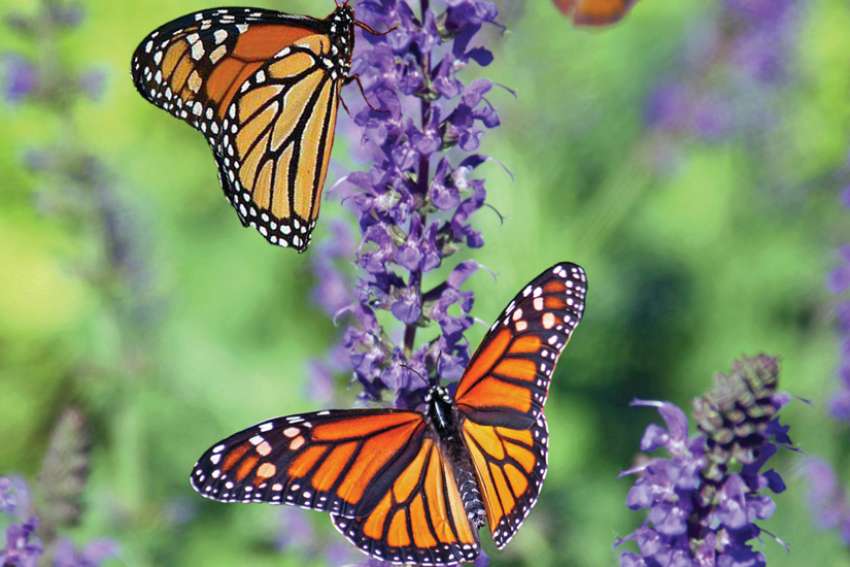Bordering on a duck pond, the backyard hosts a variety of visitors. Ducks and dragonflies, herons and hummingbirds, rabbits and robins, geese, toads and turtles spend their summers here. Wild turkeys come by in small flocks, strut sedately beside the pond, pausing occasionally to gobble seed fallen from bird feeders. And fan out their tails to impress the hens.
Tree swallows skim the surface, snapping up unsuspecting water beetles. I thank God, again, for the nesting box, newly constructed by my spouse, that was claimed by a pair of swallows within minutes of being hung. Judging by the speed with which they moved in, they must have been house-hunting for ages. The subsequent activities of those birds as they feathered their nest and raised six chicks, provided us with weeks of entertainment.
With a box of swallows in the backyard, who needs Netflix?
Wild flowers bloom in cheerful abundance beside the water. Monarch butterflies find milkweed to lay eggs on. I marvel at the God-given instinct that makes them do this. Among dozens of different plants, milkweed is the only one suitable for the soon to be born larvae. It’s God-given instinct too, that tells them, and fellow creatures, when to start on their long journey south. Tells them which way to go, guides them through storms and darkness, sees them safely home.
Goldfinches come regularly for the seeds I put out. Once, when the feeder was empty, a goldfinch came to the open window where I sat, to inform me of the fact. It clung to the window screen, chirped shrilly to get my attention, kept chirping till it was satisfied I’d got the message.
The feeder was refilled promptly. Bird brain? Smart bird!
God is present not only in the sights, sounds and scents of the garden, but also, naturally, in the compost heap. Where “all things work together for good.” Garden scraps and kitchen scraps mingle with sunbeams and raindrops; Divine recycling takes place.
Slugs and bugs chomp their way through the mess, fatten, die and decay, bequeathing their rotting corpses to the heap. Robins rummage happily, hunting fat worms at the bottom of the pile. I dump compost on the tomato bed and am rewarded with outrageously tasty tomatoes.
Our Creator is present, too, in the labour that takes place in the garden. In weary limbs and grubby fingernails. In the creative spirit of gardeners. In their love of gardening and their enthusiasm! (that word, by the way, comes from the Greek “en Theos” meaning “God within”)
“Speak to the earth and it shall teach thee.” Planting a seed in the earth — especially a parsley seed! — teaches patience. Planting a bulb, or anything at all, is a lesson in hope and trust. There’s much to be learned by observing God’s creations — furred, feathered, scaly, leafy, as they interact with one other. And with us! (In Indigenous belief all created things are related, not just to each other but to humans. Even rocks are regarded as relations.)
Connecting with the soil is good for mind, body, soul and spirit. For some, it can become a life altering experience. Years ago, somebody conceived the idea of teaching basic gardening skills to prison inmates. Presented with seeds, soil and plastic cutlery by way of tools, they were taught how to plant. To watch, wait patiently, tend the tiny green shoots, keep them adequately watered without drowning them. Hardened criminals, accustomed to roughness and violence, learned to handle delicate baby plants with care. For some, this was the first time in their life they’d had to care for anything.
After a while, a noticeable change had come over some of the inmates. They were less aggressive, more co-operative. Docile, almost.
Witnessing the miracle of life springing from dead looking seeds, that were fast becoming seeds of hope, they’d found something positive, that gave meaning to their days. They’d discovered the joy of gardening.
And hopefully, in the process, may have discovered the Creator.
The One who is to be found in all things.
(Saldanha is a writer who lives in Ramara, Ont.)


